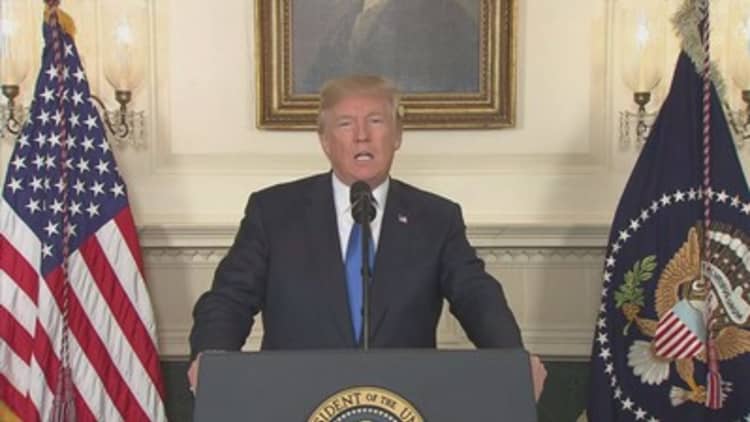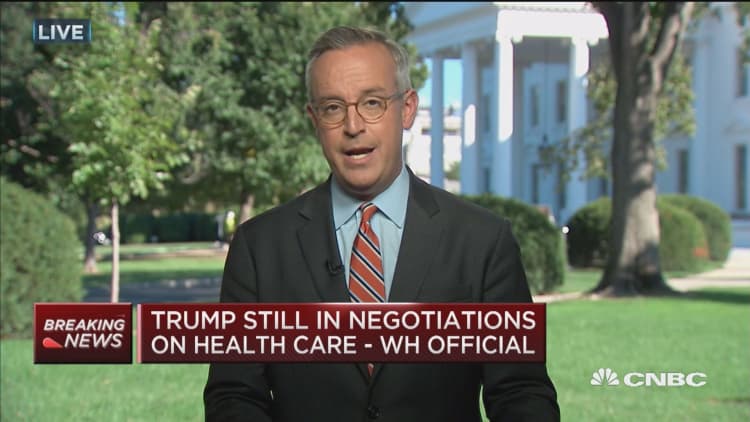
Modern American history has never seen as full-scale an effort to sabotage a valid law as we have with President Trump and the Affordable Care Act — a law whose legality has been upheld twice by the US Supreme Court.
The president has a legal obligation, under Article II of the US Constitution, to "take Care that the laws be faithfully executed." That means he must make sure that our laws are implemented in good faith and that he uses his executive discretion reasonably toward that end.
His agencies likewise have a legal obligation, under the Administrative Procedure Act — the statute that sets the rules for our entire federal regulatory apparatus — not to use their power to engage in arbitrary action.
More from Vox:
Benching NFL players for protesting during the anthem would be illegal
How nondisclosure agreements protect sexual predators
Could we reverse a hacked presidential election?
The intentional, multi-pronged sabotage of the ACA that we have seen over the past nine months — reaching new heights since attempts by Congress to repeal the law failed — violates both Trump's constitutional obligations and quite possibly the obligations of his Department of Health and Human Services.
Trump does not get to say that he can best help the law by killing it and thereby forcing Congress to start afresh. His obligation is to "take care" that the laws that are already on the books are carried out. Since he has flouted this obligation, lawsuits by individuals and states harmed by the damage he causes may now be in order.
To be sure, the take care clause is rarely invoked. Indeed, it does not appear ever to have been used successfully in modern times as an offensive tool against a president. Cases are rare because most experts agree that the president must have discretion with respect to how he enforces a law; drawing lines that separate when that discretion is exercised reasonably and, instead, when it changes too much of the law to be "faithful" to it (as the clause requires) is extremely difficult.
But whatever divides exist about invoking the take care clause, this is the extreme case in which it is clear-cut that the clause has been violated. Far from using his power to faithfully implement the ACA, the president is actively using his power to destroy it. He does not hide his motives.
A multi-front attack on the law
Let's review the most recent acts of sabotage. The ACA requires the federal government to support the open enrollment period — in which individuals must sign up for insurance or lose their chance to do so. The ACA requires the federal government to, among other things, maintain a website and work with local "navigators" and other groups to educate consumers and encourage them to sign up for insurance.
Trump instead has set out to make open enrollment a failure.
He cut the enrollment period in half, from three months to six weeks. He shut down the federal enrollment website for nearly 12 hours every Sunday during the period — a crucial window when working Americans might enroll. He has canceled already- scheduled events in which federal officials had planned to visit states and help with enrollment. He cut advertising for enrollment by 90 percent, from $100 million to $10 million, even though his administration charged insurers on the exchanges user fees to generate money for that same advertising. (Those fees far exceeded $10 million.)
One day before the new budget year began on September 1, he announced a 40 percent cut to those navigator programs — after promising them $60 million in grants in May, and afterhis administration had said it would support navigators in order to partly offset the obstacles erected by the curtailed enrollment period.
Why would President Trump want to stifle open enrollment? Because that would seriously weaken the ACA's insurance markets, which require a mix of healthy and sick customers to be stable. In line with that ambition, he also signed an executive order last week that directs his agencies to consider policies that would allow the sale of new group and short-term plans lacking many ACA protections. These alternative plans are likely to pull even more healthy individuals out of the insurance markets.
The same day, Trump announced his plan to cut off important cost-sharing payments that the ACA promises to insurers to compensate them for reducing what individuals have to pay in premiums. A case is pending in federal court challenging the legality of those payments. The president's defenders may therefore argue that he has more leeway to resist implementation of that requirement.
Even so, nearly every single week for past last nine months, Trump has threatened to cut off these payments, creating extreme instability in the insurance industry. In response, some insurers had already raised rates for 2018. So the damage was done well before the official policy was announced. And Trump has made clear that his goal in cutting off the funds is harming the law. He tweeted the same day the policy was announced: "ObamaCare is causing such grief and tragedy for so many. It is being dismantled …"
Former White House adviser Steve Bannon was blunter. Trump wanted to "blow that thing up," he said this week.
Distinguishing this case from other examples of presidential discretion
This situation is very different from those in which scholars have disagreed over whether the take care clause applies. This is not about whether the president must defend a law he thinks is unconstitutional before the Supreme Court has ruled. That question came up in the context of same-sex marriage, when President Obama declined to defend the constitutionality of the federal Defense of Marriage Act, or DOMA. Obamacare, in contrast, has survived two major showdowns in the Supreme Court. (And, notably, Obama enforced DOMA while the case was pending, even as he declined to defend it.)
This is also not a case in which the president faces tough decisions about how to use limited resources to achieve policy priorities. Such questions arose in last year's battles over Obama's immigration policies.
Trump's strangulation of broad parts of the ACA does not stem from his decision to prioritize what he views as other, more important sections of the law. No budgetary or policy justification has been offered by the White House for canceling enrollment support; nor has anyone claimed taxpayers will be saved money. In fact, the Congressional Budget Office estimates that the president's efforts to shut down cost-sharing reduction payments to insurance companies will cost the federal government almost $200 billion.
(That's because some insurance premiums will rise by more than 20 percent, in response. And when the premiums rise, the financial subsidies the ACA promises individuals to help them buy insurance must also rise, with the government footing the bill.)
Nor is HHS now using time and money saved by undermining one part of the law in order to buttress another part. Further betraying Trump's unfaithful stewardship of the law, even states that have requested waivers to pursue conservative reforms are being stonewalled by the administration. News reports say the president has told his agency staff that he does not want any such waivers approved, lest they stabilize the insurance markets.
Finally, this is also not a case about the president underenforcing a law to temporarily smooth administrative implementation of it. President Obama delayed enforcement of several ACA deadlines, including the requirement that employers provide insurance, because he believed that delay was necessary for the law to ultimately succeed. He was criticized for that, and some critics cited the take care clause.
Trump's (stated) motives matter to the legal case against him
Nonetheless, President Obama offered reasons why he believed his actions would ultimately help the law. In contrast, Trump, after chiding Congress for failing to abide by its "pledges" to repeal the ACA, tweeted that he was taking on that job himself: "So we're going a little different route. … [I]n the end, it's going to be just as effective."
And this week he added, "Obamacare is dead. It's finished. It's gone."
Motive matters, with respect to whether the president exercises his power legally. If the president exercises his discretion to further the purpose of a statute, he complies with the take care clause. If he uses his power pretextually or unreasonably, he violates the Constitution. President Trump's motives are unambiguous.
Congress could jump in and fix some of the problems Trump is causing. It could pass a statute clarifying the propriety of the cost-sharing reduction payments that Trump ended. It also could override by statute any agency regulation that, as in the case of last week's executive order, aims to destabilize the insurance markets. It would certainly be much better for our country for Congress to act than for citizens or states to have to sue the executive branch. But if Congress doesn't act, lawsuits may be an important tool.
The president has a right not to like the ACA. But so long as it is the law of the land, he does not have the right undermine it through the use of executive power.
"Faithful" execution of a law that is validly on the books is what the words of the Constitution require of Trump — until Congress decides otherwise.
Commentary by Abbe R. Gluck is a professor of law and the faculty director of the Solomon Center for Health Law and Policy at Yale Law School.
For more insight from CNBC contributors, follow @CNBCopinion on Twitter.
WATCH: Trump says he's still in negotiation on health care


